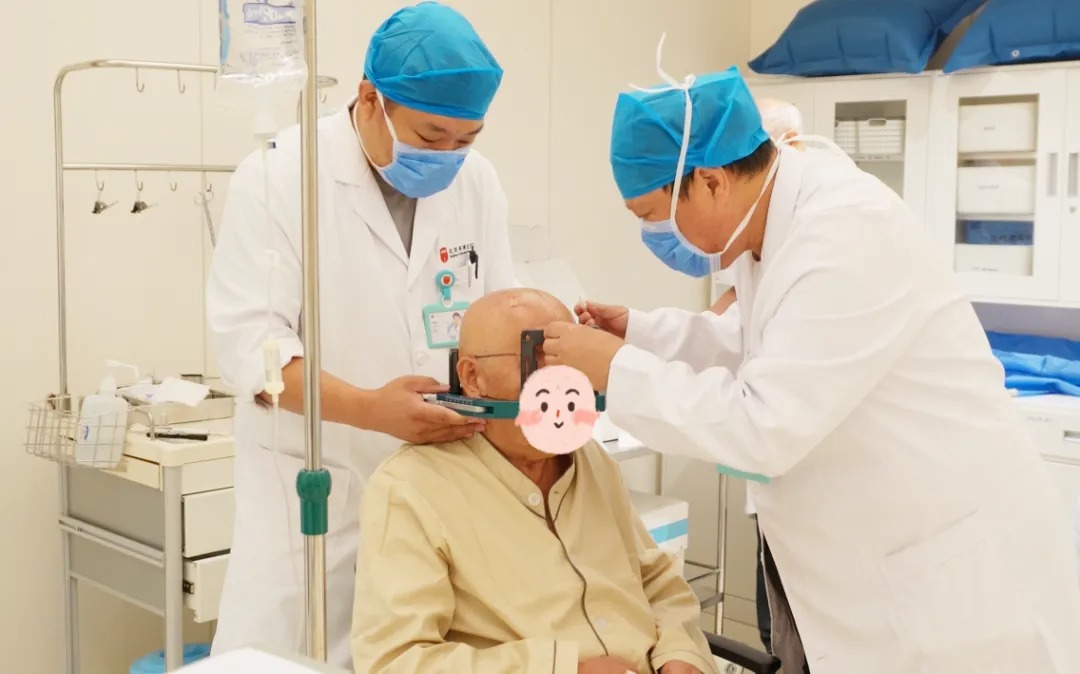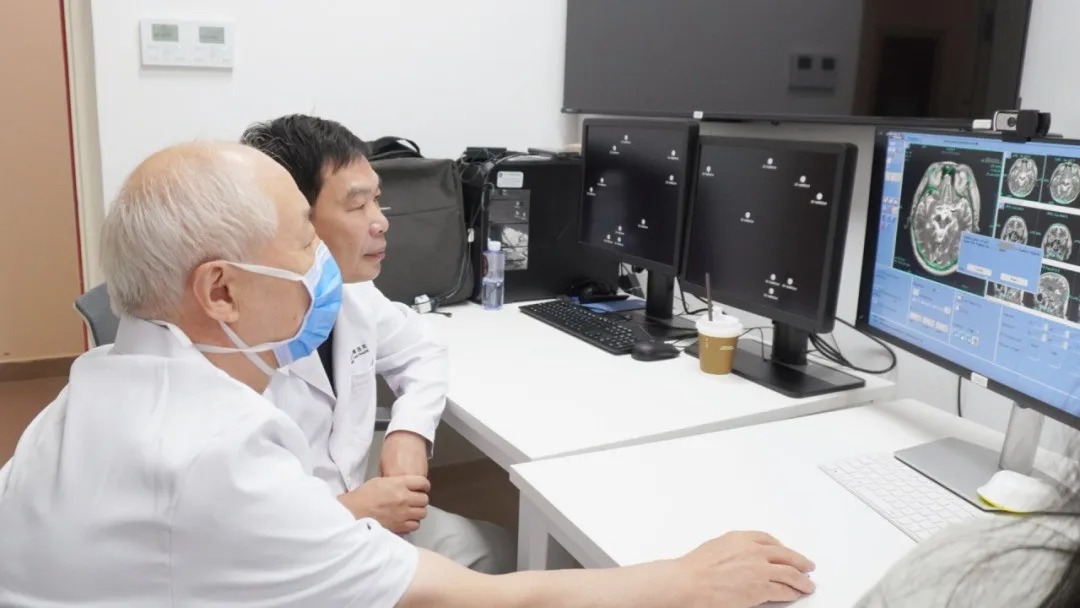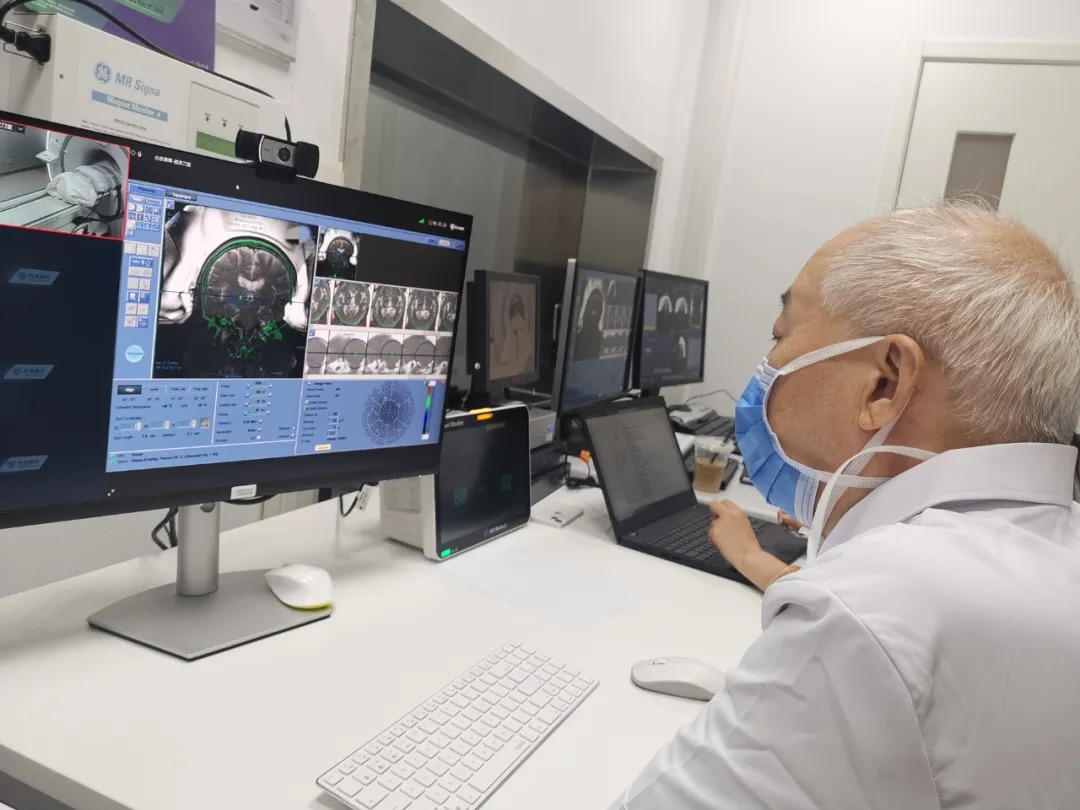Non-Surgical Brain "Magnetic Knife" Successfully Cures 10-Year Advanced Parkinson’s Disease Patient
The ten years of tremors had plunged my life into despair. My son chose the team at GoBroad Hospital for me, and after the surgery, the tremors disappeared, reigniting my confidence in life during my later years! Thank you all!"
Recently, GoBroad Hospital successfully completed a "Magnetic Knife" brain surgery for a 73-year-old patient who had suffered from Parkinson's disease for ten years. Post-surgery, the patient's left-hand tremors disappeared without any adverse reactions, and all assessment results showed significant improvement.
Idiopathic Tremors for 10 Years, Life in Despair
Mr. Zhang, 73, was diagnosed with idiopathic tremor combined with Parkinson's disease 10 years ago. Initially, he experienced mild tremors in his right leg, which worsened when emotionally agitated. While walking, the tremors were not very noticeable, and he could control them. Although the local hospital diagnosed it as "idiopathic tremor," Mr. Zhang felt he could manage his daily life and did not seek medication. Over time, however, his tremors spread from his right leg to his left arm, gradually worsening, and he started medication. The medication helped alleviate the tremors in his right leg.
As the disease progressed, the medication's effectiveness diminished, and the tremors in his arms became uncontrollable. This affected his ability to perform daily activities. Mr. Zhang became withdrawn, staying in his room and avoiding others. His family, concerned about his physical and mental health, took him to a top-tier hospital in Beijing in 2023, where he was diagnosed with "Parkinson's disease." By then, his tremors had worsened, and medication was no longer effective.
In despair, Mr. Zhang learned from a support group that non-invasive "Magnetic Knife" brain treatment was effective for improving idiopathic tremors and Parkinson's disease, offering fast results with no surgery or implants. Initially skeptical, Mr. Zhang was convinced after hearing a fellow patient's experience and watching before-and-after treatment videos. The next day, he and his family went to GoBroad Hospital for the "Magnetic Knife" treatment.
"Magnetic Knife" Assists in Precision Treatment
The expert team at GoBroad Hospital conducted a comprehensive Parkinson's disease and movement disorder assessment for Mr. Zhang, including gait and balance tests, olfactory tests, and standardized pre-surgery evaluations. Mr. Zhang met the treatment criteria for the "Magnetic Knife" brain procedure.

Before the "Magnetic Knife" treatment, Professor Ling Zhipei, a renowned expert in Parkinson's disease treatment and a consultant for the Functional Neurosurgery Department at GoBroad Medical Group, along with the expert teams from the Neurosurgery, Neurology, Anesthesiology, Imaging, and Rehabilitation Departments at GoBroad Hospital, held a pre-surgery discussion. This discussion covered patient preparation, treatment planning, target verification, thermal ablation therapy, and outcome assessment.
During the "Magnetic Knife" treatment, low-energy ultrasound was first used to focus on the initial treatment target. The neurosurgical expert team then assessed Mr. Zhang's responses in real-time, including tremor relief and possible side effects. The procedure combined focused ultrasound with magnetic resonance imaging (MRI) to precisely locate the treatment target. The ultrasound energy was gradually increased, creating highly precise and controlled ablation lesions to achieve the treatment goals.


After two hours of collaborative effort, the surgery was successfully completed. Mr. Zhang's left-hand tremor disappeared, and muscle stiffness was partially relieved, with no adverse reactions. Post-surgery, Mr. Zhang underwent a series of professional assessments, including drawing, pouring water, and the nose-to-finger test. Compared to pre-surgery results, all the assessment outcomes showed significant improvement.
The rehabilitation team customized an individualized training program for Mr. Zhang to help him achieve overall recovery and return to a happy life, enjoying his later years.
"Magnetic Knife" Creates a "New Milestone" in Brain Treatment
Neurosurgery expert, Director Yu Xin, stated, “Although called a ‘knife,’ the ‘Magnetic Knife’ doesn’t involve any incision. It combines real-time magnetic resonance imaging (MRI) and real-time temperature measurement, emitting over 1,000 ultrasound beams that precisely focus on brain targets. This creates heat in the brain, calming the activity of disturbed cells and returning them to normal. Compared to other surgeries, the ‘Magnetic Knife’ procedure is non-radiative, doesn’t require craniotomy, doesn’t involve any implants, and is highly efficient and safe.”
In February 2021, the National Medical Products Administration (NMPA) of China approved it for the treatment of drug-resistant idiopathic tremor or tremor-dominant Parkinson's disease. Transcranial MRI-guided focused ultrasound therapy has been included in the "Diagnosis and Treatment Guidelines for Primary Tremor in China (2020)" as one of the surgical treatments for drug-resistant idiopathic tremor.
The "Magnetic Knife" for brain treatment, an innovation widely used globally, has shown excellent results in clinical treatments, providing patients with an incision-free, revolutionary treatment option. As the seventh hospital in China to introduce "Magnetic Knife" treatment, GoBroad Hospital will bring a new treatment option for patients with drug-resistant idiopathic tremor and tremor-dominant Parkinson's disease.
Magnetic Knife Treatment Consultation Guide
1. Pre-Consultation Preparation
- To facilitate the consultation, it is recommended to organize your medical history and symptoms in advance. This will help doctors with communication and diagnosis, ensuring a smoother consultation process. Please refer to the following content and make a paper record of it.(i) Record the development of your condition and current symptoms.
- How did the tremor start? (e.g., sudden onset, gradual onset, etc.)
- What was the first area where symptoms appeared and how have they progressed?
- Are the "tremor" symptoms different at rest versus during movement?
- How long do the tremors usually last?
- Are tremors influenced by factors such as stress, alcohol, etc.?
(ii) Have you used any treatments or measures to alleviate the tremor symptoms? If so, please list them all.
(iii) Provide information about family medical history.
-
- Does anyone in your family have a history of tremors or other neurological diseases?
(iv) Impact of tremors on daily life and psychological well-being.
(v) Any other questions you wish to ask the doctor or information you would like to understand.
2. Appointment Booking
- Beijing GoBroad Hospital offers "Magnetic Knife" treatment for idiopathic tremor and Parkinson's disease. The Magnetic Knife surgery is a non-invasive procedure with advantages such as no need for craniotomy, no implants, low risk, and faster post-surgery recovery. To schedule an appointment, please visit the neurosurgery outpatient department. There are three ways to make an appointment:Phone Appointment: 400-696-2000
- Mini-Program Appointment: Scan the QR code to enter the "GoBroad Health" mini-program
- WeChat Appointment: Scan the QR code to add the official customer service WeChat


3. Consultation
Bring all necessary documents (including personal medical insurance card, past medical records, or recent test reports, etc.) and arrive at the hospital in advance on the day of your scheduled consultation. If you have any questions, please add the assistant's WeChat for consultation.In the future, Beijing GoBroad Hospital will continue to make strides in the field of brain science. We will actively engage in deep communication with experts and scholars from relevant associations, work closely with the expert clinical research teams, and collaborate to further advance innovative technologies like the "Magnetic Knife." As a research-oriented hospital and a public service platform for clinical research, we will continue exploring and making progress in the field of functional neurosurgery. Our efforts aim to provide more treatment options and hope for patients with complex and severe conditions and to contribute to the innovation of brain science technologies and clinical research in China.















